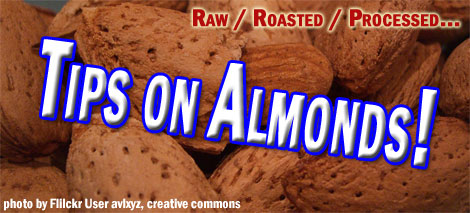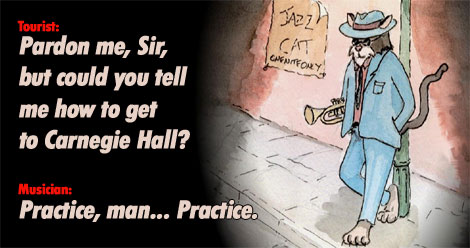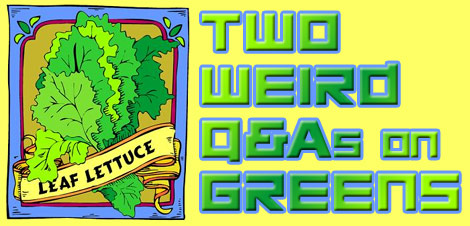Welcome to Episode FIVE! Today we're focusing on our old friend the WALNUT. Since it's officially fall, walnuts are in season right now. What better time to enjoy one of nature's tasty, heart-healthy treats?
Some health/nutrition summary info: Walnuts provide a great source of protein, fiber, B vitamins, Vitamin E, anti-oxidants to help prevent cancer, and Omega 3s to help your heart and vascular system. They also help lowering your cholesterol and blood pressure, and contain numerous beneficial amino acids and polyphenols (compounds linked with reduced risk of heart disease and cancer).

At a recent raw food meetup, I was surprised that so many raw foodies aren't aware of the raw almond controversy. Maybe most of our Pure Jeevan family members aren't aware of the fact that most almonds are not raw. It's sad, but very true. In 2006 a mandatory almond pasteurization ruling was created. The rule was passed sometime in 2007, I believe, and since then it's been near impossible to purchase truly raw almonds. Maybe pasteurized almonds don't seem like a big deal to most people.
Raw almonds are alive, yet dormant until they are soaked. Once soaked (or moistened in the springtime rains when outdoors), they sprout to begin growing into almond trees. Once soaked and sprouted, the nutritional content of the nuts change significantly. They are alive and filled with protein and so much more!

In this video, Wendi talks with Leela Mata, spiritual leader of the Peaceful Valley Ashram, about her experiences with the raw food diet and a bit about a cob oven structure that was built on the ashram property. This is part 2 of a 5-part series featuring Peaceful Valley Ashram.
Read more: Leela Mata Discusses Her Experiences with Raw Foods
Is cacao dangerous or is it a super food? Anyone who's been learning about raw foods knows about raw cacao (check out a recent episode of Know Your Food: Cacao). It's raw chocolate without all the processing and additives normally included in the chocolate bars many buy from standard grocery stores. In its raw form, cacao has different nutritional components than typical processed chocolate. Many claim that raw chocolate is filled with mega doses of nutrients, making it a super food, and therefore extremely healthy for the human body. Others claim that even in its raw state, cacao is a stimulant that taxes the human body and cacao is more like a poison than a food. I've heard murmurs about negative effects of cacao for many years, but that was always subdued by the vociferous praise of cacao.
Recently, my friend Kevin Gianni (The Renegade Health Show) spoke out about cacao and his experiences with it. Kevin is well known in the raw food community, so his words came as a shock to many people. He explained in his video (below) that he developed a rash on his stomach. After much investigating and diet changes, he came to the conclusion that cacao was causing the rash (eliminating the cacao caused his skin to clear). He also stated that cacao had been stripping his body of vital minerals. Kevin pointed out that he was simply sharing his own experience with cacao, possibly shedding some light on a subject that may need to be further investigated. He advised others to take a look at their own reactions to the food, to see if they are experiencing any problems.

Last time on Raw Foods 101 we answered the question, "Why should you soak nuts / seeds before eating them."? Naturally, many readers then asked the next logical question, "How LONG should I soak them before eating " Great question!
Don't forget:? You're soaking the nuts and seeds to "wake them up" as would happen in nature. When seeds are soaked in the springtime rain, they wake up and begin to sprout. When this happens, the nutritional content of the nuts and seeds changes (they become an even greater powerhouse of nutrients).
Read more: Raw Foods 101: How Long Should You Soak Nuts / Seeds Before Eating Them?

Jim here... Whenever I want to learn how to do something new, here's how I go about it:
>>> I practice. <<<

We just returned from the East End Food Co-op, where we answered raw food questions for two hours. We were still answering questions on our way out the door, and would have stayed longer but the place was closing. ;-) So, if anyone from this evening stops by our site and you still have questions, just comment here (or send me an email) and I'll be happy to answer them.
I'm more of a one-on-one kind of person, so I was a bit nervous about sitting in front of everyone to answer questions. Jim and KDcat were there to help me, of course, otherwise I probably wouldn't have been there at all. Once people started arriving, I was comfortable. The first people who entered the room were super sweet and I could tell they were genuinely nice people. Then little by little the room filled up, and I was surprisingly comfortable.Maybe in addition to all of the other positive changes in my life, my self confidence is getting better, too!

We all know what "greens" are in general. For example, no one questions whether lettuce, kale, spinach, or chard are greens. But on the other hand, all of those items *are* also clearly green in color. With that in mind, what would you make of the following two questions I (Jim) recently pondered -- tagged as "reader questions" so they're easily found in the future by other equally inquisitive people ;-) -- that seem bizarre, but are really quite interesting?
1. Are non-green greens (e.g., purple kale) still considered greens2. Are vegetables with green skins (e.g., cukes, zucchini) considered greens? (After all, they're green!)

To help keep all of you inspired, we ve asked some
remarkable individuals to share their raw food stories with you. Enjoy!
All this week on the Pure Jeevan blog, we'll be focusing on diabetes and the movement to naturally reverse it. We're working up to April 25th (my birthday!), which has been selected as the official Reversing Diabetes Naturally Day.
A warm, intelligent, and loving individual named Dr. Gabriel Cousens has been doing ground-breaking work and research on diabetes and diet. What he has found is so surprising that many people dismiss what he is saying, believing it to be false. But, I (along with many others in the natural health movement) am here to tell you that what Dr. Cousens has discovered is TRUE! You probably already know what he has discovered, of course: a change in diet (particulary including raw foods) can reverse diabetes!
Dr. Cousens did a small study on some diabetic individuals, documenting his work and findings. The resulting documentary is remarkable. We hosted a viewing of the movie at our home and the room was packed. Everyone sat silently, absorbing the truth of what they were seeing: diet CAN make a difference in a disease that is thought to be permanent and debilitating. Many of us had tears silently streaming down our faces, touched by the moving stories that were shared in the documentary. We were filled with a sense of excitement that there IS hope for those with diabetes!
Read more: Our Focus This Week: Reversing Diabetes Naturally


